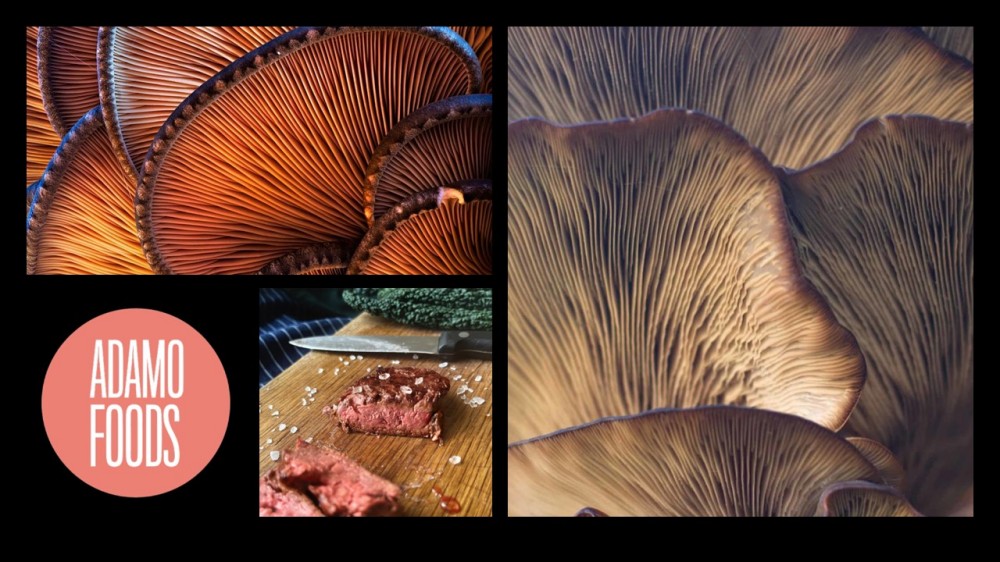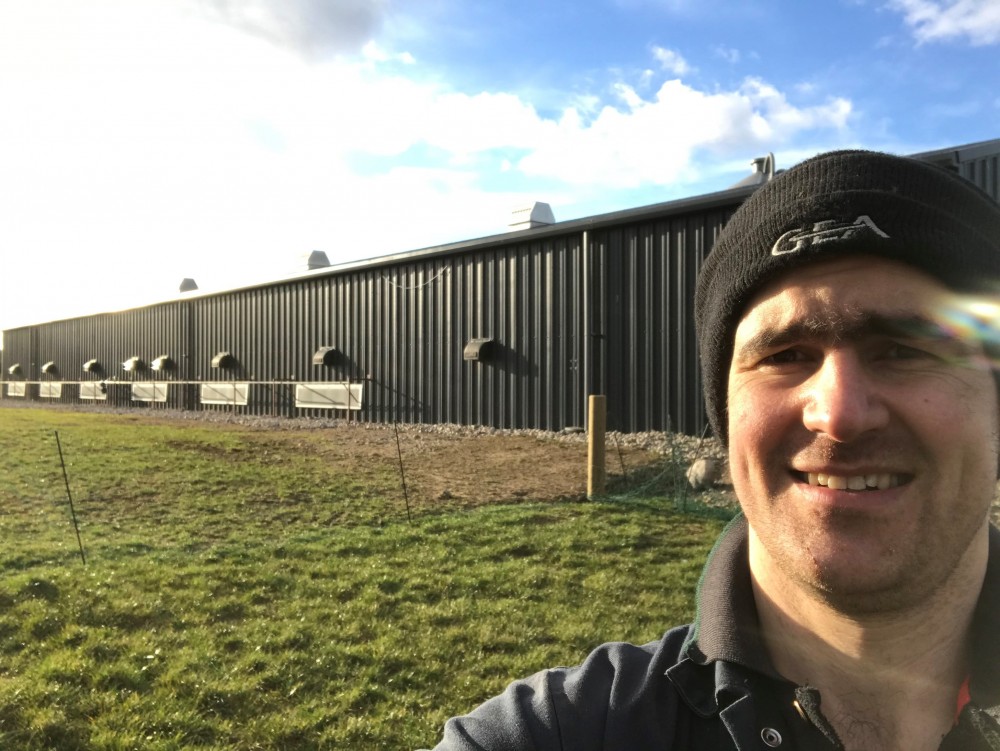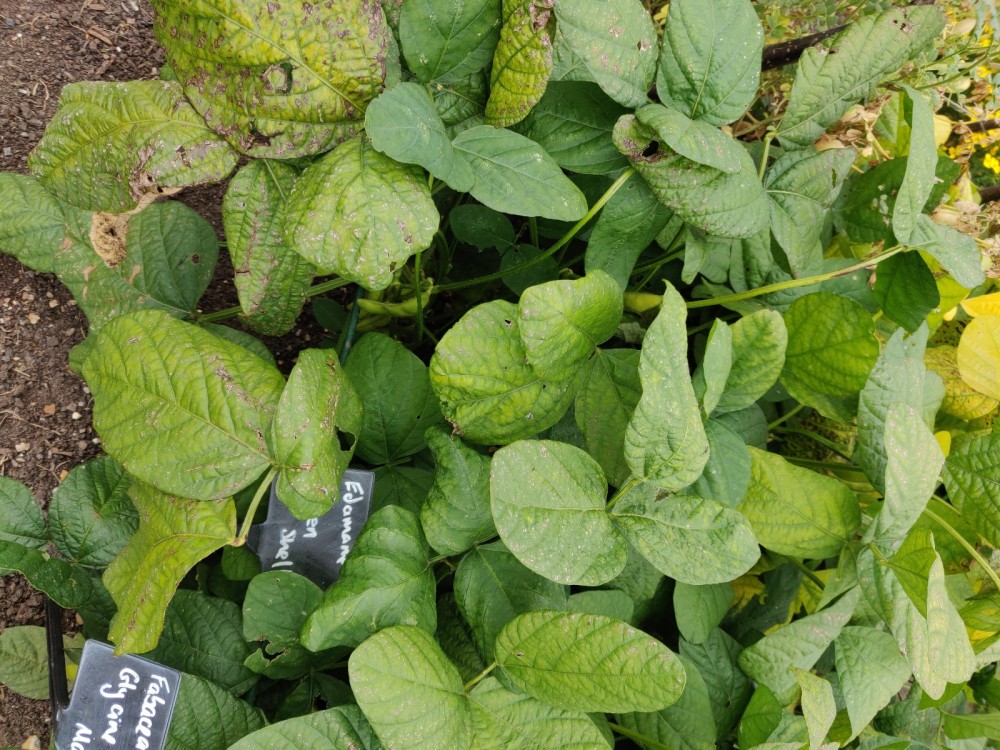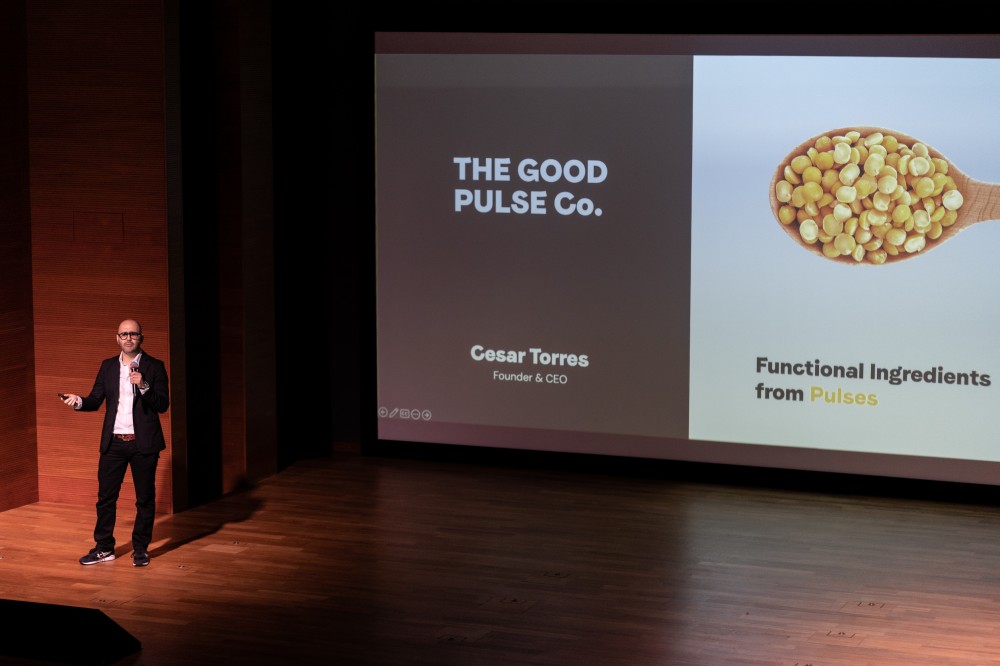Getting to the meat of it
Fungi derived product looks to mimic the whole experience of eating beef steak.

Whilst plant-based meat alternatives have come a long way in the last decade, most still fall short when it comes to that convincing meaty, juicy, chewy texture you get from tucking into a beef steak.
Adamo Foods may have cracked it though, with what they describe as ‘Europe’s first convincing alternative’.
Rather than shape and chemically coax a plant protein to have something approaching the same texture as an actual cut of meat, the team have instead turned to the already fibrous, protein-rich and root-like structures produced by fungi, which when cultivated in the right way, are just like muscles fibres.
Once aligned, these tightly packed mycelia are cut into steak shaped slabs and seasoned with a few natural flavourings and plant oils to produce the long sought-after taste, and juicy and chewy mouthfeel of a steak.
Whilst others have produced whole cut meat alternatives, Adamo say theirs is the first to truly mimic the experience of eating a grilled steak.
The market for such whole cuts currently stands at about $850 billion worldwide, so the potential is certainly there.
And as is well documented, animal farming is a leading contributor to climate change and environmental degradation, with steak one of the main culprits - using 15,000 litres of water to produce just 1kg.
The company plans to launch this year, with an initial roll out into restaurants and the wider food service industry.
Adamo Foods company website: https://www.adamofoods.com/
Adamo Foods company LinkedIn page: https://www.linkedin.com/company/adamo-foods/
SHAKE CC portfolio Cohort 4
Bridging the knowledge gap
Climate Edge New digital platform turns scientific knowledge into farmer (and climate) friendly advice

Knowledge, as they say, is power. Advisory services that provide farmers with real time information such as pest, disease or weather forecasts are proven in helping them make the right decisions at the right time - increasing yields and profits and driving down unnecessary additions of water or chemicals to their crops.
Valued at $5bn annually, there is a fast-growing market in delivering such digital services to areas such as East Africa, Latin America and India.
The major hurdle to this, though, is getting the information - based on a wealth of complex scientific research - into the hands of the growers in a form they can both understand and use.
Scientists generally lack the expertise needed to build scalable digital products and consequently, the vast majority of their knowledge goes uncommercialised.
Social-enterprise Climate Edge's digital platform solves this problem by bridging the gap between scientific research and scalable services.
By automating the key product development steps, such as turning mathematical models into operational code, hosting services on a scalable infrastructure, and making services available to farmers through an intuitive SMS interface, they are making once inaccessible information available to farmers directly through their local agribusinesses.
The Climate Edge team say scaling up just two services - irrigation scheduling and late blight sprays - within Kenya will save up to 70,000 tonnes of CO2 annually, with the company hoping to achieve revenues of £20k a month by the end of 2021.
Climate Edge were featured in "Small-scale Farmers Developing Resilience to COVID-19" IFAD investing in rural people podcast series, episode 18 at 20.40 into the podcast.
Climate Edge company website: Agricultural Software Services | Climate Edge (climate-edge.com)
Climate Edge company LinkedIn page: https://www.linkedin.com/company/climate-edge-limited/
SHAKE CC portfolio Cohort 2.
Big challenge with a small solution
EcoNomad's proprietary technology is bringing biogases to the masses

As the old adage goes: 'where there's muck, there's brass'. But in reality, the economy of scale has always limited the financial opportunities to be had from farm waste to just the big players.
Which is a shame, because apart from the much-needed savings it brings, tonnes and tonnes of slurry, uneaten food, and crop residues that could be turned into climate friendly renewable energy and liquid fertilisers, currently aren't.
In the EU alone, 1.4 billion tonnes of farmyard manure are produced each year and only 8% of that amount is being processed - which by anyone's standards, is a lot of potential.
And whilst bio-digestion is nothing new, the reason Shake has funded EcoNomad is because their proprietary technology has cracked the scale issue - offering a viable option for smaller businesses looking to cut both their carbon footprint, and their running costs.
Their biogas and nutrient recovery systems are especially designed for small farms to turn their agricultural waste into biofuels for heating, and an enriched liquid fertiliser.
By EcoNomad's own estimates, a farmer with 50 cows - or equivalent - could save around £4-5k per annum by using the solution.
The technology was successfully tested and demonstrated over four years on an urban farm in the heart of London's Docklands, but the idea for it was born five thousand miles away.
"While I was working in Mexico, I saw first-hand the need for a scaled down version of these sort of technologies," says EcoNomad founder and CEO, Dr Ilan Adler. "And that this is a problem that is faced by smallholders the world over."
He was so convinced, he set up a non-governmental organisation - IRRI-Mexico - and helped found a successful social enterprise to promote eco-technologies in rural communities, with the result being the eventual development of EcoNomad in the UK along with business partner, Alex Demenko.
With two patents under their belt and a larger demonstration underway at Rothamsted Research, the pair plans their first sales this autumn.
EcoNomad company website: https://economad.co.uk/
EcoNomad company LinkedIn page: https://www.linkedin.com/company/economad/
SHAKE CC portfolio Cohort 1.
Rubbish in, food out
In the war on waste, it's time to send in the tiny troops

How much of our refuse goes to landfill versus recycling is still a big issue in the UK - but imagine how big of a problem it is for developing countries that don't have sufficient waste management infrastructure.
It's a shame because a lot of biodegradable waste that could be put to good use elsewhere is just being dumped, either legally or illegally. Apart from all the other environmental costs, as this material rots, it produces potent greenhouse gases. In these situations, a low-cost intelligent technology that is easily employed without the need for extensive waste removal and disposal services would do well.
London based Entio Ltd think they have found just such a solution - albeit with assistance from an army of voracious little helpers. The larvae of Black Soldier Flies are great natural composters - readily devouring the sort of plant-based wastes typically produced by farms, whilst (once mother nature takes her course) also producing a nutrient rich fertiliser. But even better, the little wrigglers soon turn into protein rich adults who can be also turned into ingredients for aquaculture, pet and - dare we say it - human food stuffs.
Founders Rafael Cepeda and Camilo Wilisch say their edible protein and fertiliser production method produces negligible greenhouse gases, is low cost and easily employed across rural areas where biodegradable waste production is high - which can be as much as 80% of the refuse in some cocoa farming areas.
Entio company website: https://www.ent-io.com
SHAKE CC portfolio Cohort 2.
Greater returns
Rather than tackle greenhouse gases head on, Glaia have found a clever way to get more crop from less carbon.

Many climate friendly technologies tackle the issue of emissions directly - but Bristol based duo Dr Imke Sittel and Dr David Benito decided to approach the problem from the other direction. What if we could improve current productivity without increasing the carbon footprint?
By increasing a crop's potential, it will produce the same yield with less inputs, which also means less emissions - in their case, a whopping 20% less.
Glaia's clever carbon-based nanotech improves the efficiency of photosynthesis - the energy producing process by which plants use carbon dioxide, water, and energy from the sun to fuel their growth.
You might think billions of years of evolution had fine tuned this to the max - but in fact, usually less than 1% of the sun's rays absorbed by plants are turned into biomass.
Adding Glaia's water soluble 'sugar dots' to the roots or leaves gives photosynthesis a much-needed boost.
The technology could revolutionise the production of staple and horticultural crops, but for now the team is focusing on hydroponic tomatoes and strawberries, where they estimate the added value could initially result in a fivefold return on investment.
The hope is to expand into the EU within four years, and North America within six. Globally, the market value of their product could be worth in excess of $1.5 billion for their first targeted crops.
Glaia CSO and co-founder Dr Sittel said: "Our mission is to enhance agricultural productivity and reduce pressure on natural resources by optimising plants' performance. Our first family of products, the sugar-dots, are able to enhance photosynthesis, the current bottleneck in biomass production.
"Our technology increases crop yields, and by allowing plants to use more of the available light they could be farmed outside their traditional growing regions by simply applying it alongside traditional farming treatments."
39 ways to save the planet - Phenomenal Photosynthesis
Glaia were featured in "39 Ways to Save the Planet" - a BBC series made in partnership with the Royal Geographical Society. Can we improve nature's engine room - the amazing process of photosynthesis?
https://www.bbc.co.uk/sounds/play/m000r5nz
Glaia company website: http://www.glaia.co.uk/
Glaia company LinkedIn page: https://www.linkedin.com/company/glaia/
SHAKE CC portfolio Cohort 1.
A tasty nest egg?
Profits from this newly hatched idea certainly won't be chicken feed

Soya beans have become a battleground of sorts in the ongoing war over the climate impacts of our food, given that - directly and indirectly - it feeds vegan and meat eater alike.
Soya cultivation is responsible for mass deforestation, particularly in places like Brazil and every year the EU imports 39 million tonnes of soya, of which 35 million is destined for animal feed.
TV pictures of pristine tropical forest being destroyed provides a very graphic illustration of how our eating habits are impacting the planet, and it's just such images that drove Scottish poultry farmer Gordon Whiteford to come up with a completely new way to feed his own free-range hens.
As a Nuffield scholar, Gordon studied animal welfare across the world and saw the potential to develop a different system of feeding hens to reduce the reliance on soya.
The HE Feed system will be perfect for free range and organic systems, where about 23 million free range hens are reared every year.
Founder Gordon Whiteford LinkedIn page: https://www.linkedin.com/in/gordon-whiteford-11a6334b/
SHAKE CC portfolio Cohort 1
Fatal Attraction

Sex, death and food are all in play when it comes to cutting the climate footprint of pest management say PheroSyn Ltd
Of the oft-cited concerns over pesticide use, climate change isn't usually high on the list.
However, when you factor in fossil fuel consumption during its manufacture and its application on farms, its considerable. For instance, the fuel used by UK wheat farms when spraying pesticides results in the equivalent of 385,000 tons of carbon dioxide emitted every year - the same as about 80,000 cars.
Scale that up globally, and less pesticide use is clearly a desirable outcome - but with an estimated 40% of the world's food supply at risk without protection from insects, we need alternatives.
Insect pheromones - the information rich, chemical scents that warn, inform, or attract other members of the same species - have been targeted as crucial tools for use in the next generation of pest management strategies to minimise pesticide use.
If the new strategies can hijack these pheromone communication channels, they can either attract insect pests somewhere else with the promise of sex, or can literally scare the pests out of a field.
What in fact they are doing is luring them to their deaths - resulting in a sticky end in a pheromone scented trap.
PheroSyn Ltd, a spin-out from Rothamsted Research, comprises a world-leading team of scientists with over 40 years' collective experience of researching and developing insect pheromone baits. The team plan to tap into the lucrative pheromone business - globally estimated to be worth $400 million a year and growing rapidly at a 15% annual growth rate.
By focusing initially on destructive midge pests that are not currently catered for by the other market players, the spin-out hopes to have sales of their market ready pheromones at the - 10 million mark within five years.
PheroSyn company website: https://www.pherosyn.com/
PheroSyn company LinkedIn page: https://www.linkedin.com/company/pherosyn-ltd/
SHAKE CC portfolio 2019.
Resurrected Resistance – giving crops a fighting chance
In the never ending, running-to-stand still, arms race of pest versus plant, we've put our crops at something of a disadvantage

Years of selective crop breeding has helped bump up yields and enhanced other traits such as drought tolerance – but, with an armoury of chemical pesticides to fall back on, we’ve mostly neglected the resistance genes that give plants that vital protection from diseases.
In the wild, having to fend off pests or diseases means those plants with natural immunity would survive to set the most seed, thereby giving subsequent generations a fighting chance. But on the farm, the seeds planted the next year won’t have gone through any such selection process.
Our crops are, figuratively at least, fighting with one stem tied behind their backs.
With diseases and pests shifting their ranges under climate change, and a widespread desire to reduce our use of farm chemicals (which in themselves contribute to carbon emissions), London based start-up Resurrect Bio is looking to put the R back into resistance.
Using the latest precision breeding techniques, the team plans to resurrect some long-defeated resistance, or ‘R’, genes, in soy and other crops.
Doing so would give the crop a fighting chance against the cyst nematode, of which there is currently no defence and leads to $1.5 billion dollars of soy yield lost every year in the US alone.
Bringing a unique understanding of the way pathogens causes disease and the how an immune response is mounted, Resurrect Bio say their approach is both precise and robust.
In addition, by tailoring their gene editing approach to each crop-disease system, it actually adds to overall genetic diversity without adding any foreign DNA.
Resurrect Bio company website: https://resurrect.bio/
Resurrect Bio company LinkedIn page: https://www.linkedin.com/company/resurrect-bio/
SHAKE CC portfolio Cohort 4.
Feeding a growing population sustainably
A spray controlling the botanical equivalent of blood sugar massively boosts yields

It’s oft reported that with a population approaching 9 billion, feeding the world will be a big task come 2050. The climate and land use impacts of all this extra agriculture will be enormous.
Luckily, start-up SugaROx - founded by Rothamsted’s Dr Matthew Paul, Dr Cara Griffiths, and Prof Ben Davis from Oxford University - might just have the solution.
Aside from the impact on farm outputs, this also increases land use efficiency and leads to a carbon-emissions - and a staggering 21% carbon emission saving per cropping season.
SugaROx’s proprietary technology consists of a modified form of T6P that can cross cell membranes, and the first product in the pipeline will be able to increase wheat yields without further input of water or fertiliser - a finding first published in @Nature Research Publishing.
SugaROx is leveraging this game-changing technology to develop products that slot seamlessly into existing agricultural practices, offering ease-of-use for farmers. Their first product, a biostimulant for wheat, will be applied together with a fungicide application already adopted by farmers.
Glasshouse tests on four new crops showed the potential of the technology in other market segments were striking as well - as shown in image, results on sorghum were striking.
SugaROx company website: https://sugarox.co.uk/
SugaROx company LinkedIn page: https://www.linkedin.com/company/sugarox-ltd/
SHAKE CC portfolio Cohort 2.
The heartbeat of an alternative protein industry
Focusing on functional, sustainable, cleaner, and minimally processed proteins from pulses could shake the alternative protein business to its roots

The impact of the meat and diary industry on the climate is a staggering 14 % of global Greenhouse gas emissions. Fortunately, for a variety of reasons, including ethics and wellness, demand for alternative proteins is a fast-growing market, with consumers increasingly willing to shift their consumption to alternative proteins - when they can find products that live up to their tastes, expectations, and budget.
However, most plant-based cheese and meat alternatives use either pea or soya proteins, which are still produced using chemically intensive methods that maximise purity and yield rather than functionality. When used in foods, companies making plant-based alternatives must use artificial additives and other ingredients (e.g.: emulsifiers, thickeners, gelling agents, texturisers, stabilisers, amongst others) to improve the characteristics of their products and make them more palatable to consumers. All this increases ingredient lists and production costs, while also making their products more highly processed and unhealthy.
Good Pulse Co’s mission is to power the transition to plant-based foods by providing sustainable and minimally processed ingredients that make it easier and cheaper for food companies to create more nutritious dairy, meat and baked-goods alternatives. Their unique processes focus on maximizing functionality, nutrition, and re-valorisation of all components extracted from pulse seeds – all of which create low-allergenicity ingredients, increase sustainability, eliminate additives, and reduce costs and waste – enabling food companies to offer attractive products to accelerate the shift from animal- to plant-based diets.
The Good Pulse Co. company website: https://www.goodpulse.co/
The Good Pulse Co. company LinkedIn page: https://www.linkedin.com/company/the-good-pulse-company/
SHAKE CC portfolio Cohort 3.
Recover, Rotate, Regenerate

There is no waste in nature. Organic matter... matters.
The Tumblebug, or dung beetle, is the unsung hero of the natural world! With over 6000 species worldwide, they pull nutrients from manure and take them down into the soil. This helps feed the good bacteria and microbiology in the soil.
In a similar vein, Tumblebug Ltd have created a technology which draws from the work of the dung beetle. The brainchild of Environmental Scientist and Circular Economy Consultant, Sylvie Verinder and alpaca farmer, Drew Thomas, Tumblebug have created a sustainable solution for capturing and concentrating the nutrient value in livestock manure to return the nutrients efficiently to the soil – reducing reliance on synthetic fertilisers as well as acting as a revenue generator for farmers.
The problem of right nutrients, wrong place has been exacerbated by the increasingly specialised nature of agriculture in the UK. The Tumblebug: Recover, Rotate, Regenerate model works for livestock manure from dairy, pig, alpaca and poultry. The method creates a carbon positive regenerative product and enables the value in manure (and food waste) to be economically and sustainably transported from point of production to where the nutrients are needed.
Tumblebug’s clever system enable farmers to generate revenue from their ‘processed poo’ and in doing so become part of a growing cooperative, putting their names to a cleverly crafted peat alternative growing medium and agricultural fertiliser which will enrich the nation’s horticultural and agricultural soils.
Tumblebug tackle organic ‘waste’ at all stages of the ‘farm to fork’ journey - production, processing, retail and consumption. It supports segregation of organic waste from general waste - and it dewaters, sanitises and reduces the mass by up to 90%. Working with stakeholders to secure behaviour change, Tumblebug delivers significant reductions in waste management overheads, calculated carbon emission savings and supports compliance with 2023 mandatory segregation of organic waste.
This positive impact on the climate aligns with our mission at SHAKE and we welcome the opportunity to support Tumblebug’s venture.
Tumblebug company website: https://tumblebug.co.uk/
Tumblebug company LinkedIn page: https://www.linkedin.com/company/tumblebug-ltd/
SHAKE CC portfolio Cohort 3